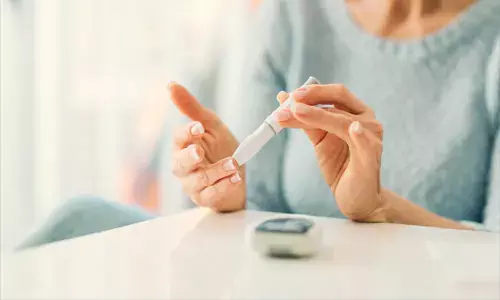- Home
- Medical news & Guidelines
- Anesthesiology
- Cardiology and CTVS
- Critical Care
- Dentistry
- Dermatology
- Diabetes and Endocrinology
- ENT
- Gastroenterology
- Medicine
- Nephrology
- Neurology
- Obstretics-Gynaecology
- Oncology
- Ophthalmology
- Orthopaedics
- Pediatrics-Neonatology
- Psychiatry
- Pulmonology
- Radiology
- Surgery
- Urology
- Laboratory Medicine
- Diet
- Nursing
- Paramedical
- Physiotherapy
- Health news
- Fact Check
- Bone Health Fact Check
- Brain Health Fact Check
- Cancer Related Fact Check
- Child Care Fact Check
- Dental and oral health fact check
- Diabetes and metabolic health fact check
- Diet and Nutrition Fact Check
- Eye and ENT Care Fact Check
- Fitness fact check
- Gut health fact check
- Heart health fact check
- Kidney health fact check
- Medical education fact check
- Men's health fact check
- Respiratory fact check
- Skin and hair care fact check
- Vaccine and Immunization fact check
- Women's health fact check
- AYUSH
- State News
- Andaman and Nicobar Islands
- Andhra Pradesh
- Arunachal Pradesh
- Assam
- Bihar
- Chandigarh
- Chattisgarh
- Dadra and Nagar Haveli
- Daman and Diu
- Delhi
- Goa
- Gujarat
- Haryana
- Himachal Pradesh
- Jammu & Kashmir
- Jharkhand
- Karnataka
- Kerala
- Ladakh
- Lakshadweep
- Madhya Pradesh
- Maharashtra
- Manipur
- Meghalaya
- Mizoram
- Nagaland
- Odisha
- Puducherry
- Punjab
- Rajasthan
- Sikkim
- Tamil Nadu
- Telangana
- Tripura
- Uttar Pradesh
- Uttrakhand
- West Bengal
- Medical Education
- Industry
Urinary podocin early marker of diabetic nephropathy in T2D, finds study

The urinary podocin can serve as an early marker for diabetic nephropathy as well as a marker of disease progression and severity among the patients with Type 2 Diabetes, suggests reports from a newly published study in Journal Of The Association Of Physicians In India. "The standard risk factors have to be identified early and controlled in order to slow down the progression of diabetic kidney disease." The research team further elaborated.
The development of diabetic nephropathy demands an early detection aiming to decrease the incidence of end stage renal incidence. Podocyte injury is an essential element in the diabetic renal disease occurrence and progression. Researchers attempted to identify podocyte markers in the urine of patients with and without overt diabetic nephropathy, in comparison with controls to diagnose early podocyte injury.
The study included Type 2 Diabetic individuals with 45 of them having normoalbuminuria, 40 patients with microalbuminuria and 40 of them with macroalbuminuria (based on the albumin-creatinine ratio - ACR) and 45 non diabetic healthy controls from a medical college hospital from South India. Urinary podocin quantification was done among all these patients and compared among the different groups of study, along with other parameters.
Results revealed some interesting facts.
- The fasting blood sugar, post prandial sugar, glycosylated haemoglobin, triglyceride levels and the duration of diabetes along with systolic and diastolic blood pressure, body mass index, all seemed to be strong risk factors for the diabetic kidney disease progression showing a significant correlation with microalbumin, glomerular filtration rate and urine albumin-creatinine ratio.
- Podocin was excreted in the urine at higher concentrations among patients with ACR less than 30, ACR 30-299 and ACR more than 300 compared to healthy controls respectively (p < 0.001).
- The glomerular filtration rate showed significant negative correlation with the levels of podocin excreted in urine whereas urinary podocin positively correlated with the fasting blood sugar, post prandial sugar, glycosylated haemoglobin, triglyceride levels and the duration of diabetes along with systolic and diastolic blood pressure, body mass index, microalbumin and urine albumin-creatinine ratio.
For full article follow the link: https://www.japi.org/x284d4a4/a-study-of-the-risk-factors-and-urinary-podocin-as-an-early-prognostic-indicator-of-renal-injury-in-diabetic-nephropathy
Source: Journal Of The Association Of Physicians In India
Dr Satabdi Saha (BDS, MDS) is a practicing pediatric dentist with a keen interest in new medical researches and updates. She has completed her BDS from North Bengal Dental College ,Darjeeling. Then she went on to secure an ALL INDIA NEET PG rank and completed her MDS from the first dental college in the country – Dr R. Ahmed Dental College and Hospital. She is currently attached to The Marwari Relief Society Hospital as a consultant along with private practice of 2 years. She has published scientific papers in national and international journals. Her strong passion of sharing knowledge with the medical fraternity has motivated her to be a part of Medical Dialogues.
Dr Kamal Kant Kohli-MBBS, DTCD- a chest specialist with more than 30 years of practice and a flair for writing clinical articles, Dr Kamal Kant Kohli joined Medical Dialogues as a Chief Editor of Medical News. Besides writing articles, as an editor, he proofreads and verifies all the medical content published on Medical Dialogues including those coming from journals, studies,medical conferences,guidelines etc. Email: drkohli@medicaldialogues.in. Contact no. 011-43720751


